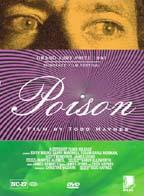FILM NOTES
FILM NOTES INDEX
NYS WRITERS INSTITUTE
HOME PAGE

Directed by Todd Haynes, produced by Christine Vachon
(United States, 1991, 85 minutes, b&w and color, 35mm)
RATED NC-17, VIEWER DISCRETION ADVISED
Cast:
Scott Renderer. . . . . . . . . . John Broom
Larry Maxwell . . . . . . . . . .Dr. Thomas Graves
James Lyons . . . . . . . . . .Jack Bolten
Edith Meeks . . . . . . . . . . Felicia Beacon
Mille White . . . . . . . . . . Millie Sklar
The
following film notes were prepared for the New York State Writers
Institute by Kevin Jack Hagopian, Senior Lecturer in Media Studies
at Pennsylvania State University:
You feel director Todd Haynes jogging along beside his own films, using color and cinematography and music and editing to italicize every moment. Haynes works hard to frustrate the simple identification that Hollywood usually exults in, making every viewer over into the analyst of cinema Haynes might rightly be called. His films are exquisitely strange, from the notorious Superstar: The Karen Carpenter Story (a docudrama of the singer's life and tragic death told with Barbie dolls), to his great mainstream hit of 2002, Far From Heaven, a film which painstakingly explicated the lurid 50's melodramas of Douglas Sirk as if movies and American popular culture were Holy Writ - which, to the deeply cinephilic Haynes, they clearly are.
Haynes graduated with a degree in semiotics from Brown University in 1985, and his films are archly fabricated sign systems of passion, texts that constantly announce their own estrangement from realism, embracing the kind of stylization found as a basic visual language in old movies. This is an epistemology of uncloseted expressionism, in which the ostensible subject of a film is lovingly fetishized. By moving farther and farther away from reality through his use of ornamental cinematic devices, Todd Haynes ironically finds his way closer to the heart of a humane truth about those who live and love on the margins.
Poison was inspired by the work of Jean Genet, a man who could map the margins like a prisoner could map his own cell. Like Dead of Night and Boccaccio `70, Poison is a story of stories. Poison's stories are all sordid novelettes that feature none of the same characters, yet all seem wound around the same core of alienated sex and violence. There is "Hero," in which a seven year old, Richie, kills his father, and we watch a low-rent "documentary" that celebrates the boy's brief, strange life. Then there is "Horror," a perverse homage to the black-and-white horror cinema of Lugosi, Karloff, and, presumably, Nietschze. A mad scientist goes nuts after downing a potion of highly concentrated human sexual hormones. A loyal assistant who loves him struggles to render him normal again, but suffers because of it. Finally, there is "Homo," in which a prisoner obsesses on another inmate, and muses on his own suppressed passion in the murky half light of his own memories.
In these films, it is less sexuality itself that is perverse than the society which causes sexuality to work itself out in such narrowly-construed orthodoxies that marginal sexualities are forced through the remaining social orifices of cruelty and self-loathing. Haynes scholar Keith Uhlich has cogently argued that these three stories are in fact one: a tripartite allegorical narrative of a single gay man. Conspiracy, plague, forced confessions, pathology; these are the terms in which sexual life is lived in Poison. But here, it is not violent sexuality itself that taints society, but almost the reverse: a repressive society that imbues sexuality with a jittery, explosive hormone of fear and desire that has no "normal" outlet - and so ends in gory disaster. And Todd Haynes is there to film the whole thing, as Norma Desmond of Sunset Boulevard might have said, "in Technicolor, to photograph the red swollen tongue" of the movies. And yet, Haynes plainly does not see himself as a clinician, but as a sympathetic therapeutic presence just out of camera range. Although the phony "documentary" in the "Hero" section of the film is dimly reminiscent of a similar device in Natural Born Killers, Haynes is far beyond an earnest "the media made me do it" argument. Quite the reverse; it is in the mediascapes of low-budget films noir like Budd Boetticher's The Killer is Loose and Technicolor death fantasies like The Red Shoes, of Irving Klaw's quaint softcore bondage cinema, of the techno-erotic laboratories of 1930's Universal horror films, of driver's ed "instructional" films about death on the turnpike, to which Haynes' heroes find themselves transported. Theirs is almost a grateful exile, for the "real" world is so filled with paranoia and intolerance that, for their sad and disturbed psyches, a movie set is the only place where they can find a refuge worthy of their outsized desires and secret loves.
— Kevin Hagopian, Penn State University
For additional information, contact the Writers Institute at 518-442-5620 or online at https://www.albany.edu/writers-inst.
 Poison
Poison